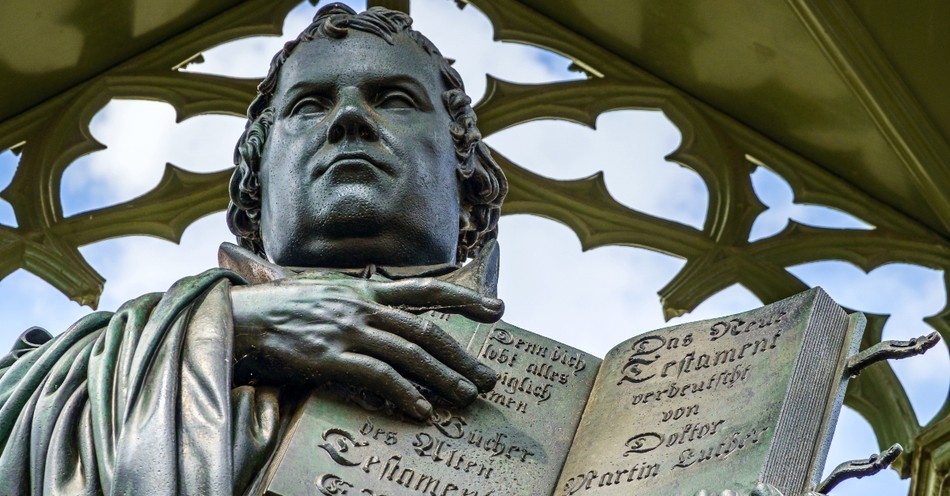The month of October is recognized by many as the month when the leaves change and fall to the ground, crisper temperatures emerge, and fall decorations abound, consisting of pumpkins, hay bales, and beautiful corn. October 31 is the day many in the West celebrate Halloween.
It is the month when scary decorations are found arraying many lawns and businesses. However, the month of October is a very important time in Christian history.
This month is known as Reformation month by Christians, the time to reflect on the Protestant Reformation and the reformers that fought to have the written Word of God available to all.
Particularly, we are able to celebrate October 31 in a different way because of what occurred on this fateful day for the lives of other reformers.
According to Steve Nichols, “It is the day the light of the gospel broke forth out of darkness. It was the day that began the Protestant Reformation. It was a day that led to Martin Luther, John Calvin, John Knox, and many other Reformers helping the church find its way back to God’s Word as the only supreme authority for faith and life and leading the church back to the glorious doctrines of justification by grace alone, through faith alone, in Christ alone.”
It is also worth noting William Tyndale and his contribution to public access to the Word of God in that he was the first to translate the Bible from Greek to English. In 1525, the first copies of his translation of the New Testament were smuggled into England.
He published the first English New Testament in 1526. In 1529, he, along with a friend, set about translating the Old Testament. However, it was in 1534 that Tyndale was betrayed by Henry Phillips, and Tyndale was held as a prisoner in the castle Vilvorde, and according to this author,
“He was judged guilty of heresy and on October 6th, 1536, was taken from prison, tied to the stake and strangled. Then his lifeless body was burnt to ashes. His last prayer, was, “Lord, open the King of England’s eyes.” Within a year the English Bible received royal recognition, and a year later every parish church in England was supplied with its own copy.”
It can be easy to forget every time we open our Bibles, but the price to read it freely and in our native language was great.
The Righteous Shall Live by Faith
On October 31, 1517, Martin Luther nailed his 95 theses to the church door in Wittenberg, Germany. This was no small act he committed, as it severed ties with the Catholic Church to bring about the Protestant Reformation. Luther specifically confronted the corruption within the Catholic Church.
An area of significance to be challenged was the practice of selling indulgences to people with the claim of decreasing time in Purgatory and needing penitence for sins. In the time of Luther, a German monk had translations of Bible texts that were making their way to the public.
In addition to his questioning of the Roman Catholic church, he embraced the belief that the Bible, not the church, was the supreme authority. He also came to believe that salvation is by grace alone through faith alone in Christ alone.
Good works had no effect on this salvation. He came to understand this in his study of Romans 1:17, “For in it the righteousness of God is revealed from faith for faith, as it is written, “The righteous shall live by faith.”
This particular verse first appeared in the Old Testament in the Book of Habakkuk. Rather than reading it in Latin as he was accustomed, he also examined a specific Greek word that changed everything for him.
The Latin word for righteous had a different meaning than the Greek word, and when he examined the Greek word for righteous, he realized the difference between making one righteous through religious acts and being counted as righteous.
It was illumination by the Holy Spirit to see the truth of the Gospel of Jesus Christ: God freely gives His righteousness by grace to those who place their faith in Christ for salvation. In and of ourselves, we do not have any righteousness.
Isaiah 64:6 says, “All of us have become like one who is unclean, and all our righteous acts are like filthy rags; we all shrivel up like a leaf, and like the wind our sins sweep us away.”
Throughout Scripture, we are reminded of our utter need and dependency upon Christ to save us and to cleanse us from all unrighteousness. Through faith in Him that is given to us by God’s grace alone, we are counted as righteous.
It was at this moment that Luther understood the truth of the gospel. His righteousness could not save him. It was a righteousness belonging to another yet given freely.
Luther is quoted as saying, “When I discovered that, I was born again of the Holy Ghost. And the doors of paradise swung open, and I walked through.”
Luther’s challenge with the truth of the Word placed him in harm’s way with the church. In 1520, Luther’s ideas were deemed heretical by Pope Leo X.
He was excommunicated from the Catholic church in 1521 after refusing to recant his beliefs. He hid in Germany during this time and translated the New Testament into German, and his entire translation of the Bible was released in 1534.
Thank God for the Word of God
Fallible men were used in a dark time to bring forth the light of the Gospel of Jesus Christ. We are reaping the benefits today of the Bible’s availability in many languages and translations because of their work and sacrifice. We are blessed to have God’s Word He sovereignly preserved through time.
Personally, when I think about the ability to read God’s Word whenever I want, it convicts me of not reading it as often as I should. It causes me to rejoice that these men paid the price they did so that we can now read the full Word of God.
We are able to hide His Word in our hearts while His Word is a lamp to our feet and a light to our path (Psalm 119:105). We are able to declare the Gospel of Jesus Christ and to proclaim the word of prophecy (2 Peter 1:19-21).
Jesus told those who had believed in Him in John 8:31-32, “If you hold to my teaching, you are really my disciples. Then you will know the truth, and the truth will set you free.” His teaching is found in His written Word, and when we abide in this Word, we can know this liberating truth.
Martin Luther once said, “I’ll trust in God’s unchanging Word, till soul and body sever, for, though all things shall pass away, His Word shall last forever!”
He also stated simply stated as one of the 95 theses, “The church’s true treasure is the gospel of Jesus Christ.” There is great freedom and joy that can only come from faith in Jesus Christ. To this, we say amen!
For further reading:
10 Things to Know about Martin Luther and His 95 Theses
Reformation Day and it's Connection to Halloween
What Was the Protestant Reformation
Photo Credit: ©iStock/Getty Images Plus/FooTToo





